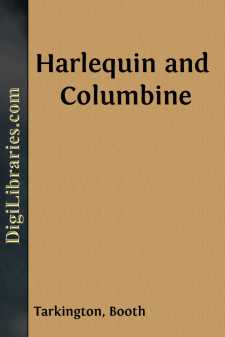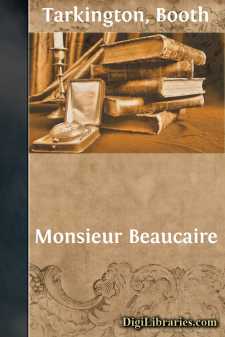Categories
- Antiques & Collectibles 13
- Architecture 36
- Art 48
- Bibles 22
- Biography & Autobiography 813
- Body, Mind & Spirit 141
- Business & Economics 28
- Children's Books 12
- Children's Fiction 9
- Computers 4
- Cooking 94
- Crafts & Hobbies 4
- Drama 346
- Education 46
- Family & Relationships 57
- Fiction 11826
- Games 19
- Gardening 17
- Health & Fitness 34
- History 1377
- House & Home 1
- Humor 147
- Juvenile Fiction 1873
- Juvenile Nonfiction 202
- Language Arts & Disciplines 88
- Law 16
- Literary Collections 686
- Literary Criticism 179
- Mathematics 13
- Medical 41
- Music 40
- Nature 179
- Non-Classifiable 1768
- Performing Arts 7
- Periodicals 1453
- Philosophy 64
- Photography 2
- Poetry 896
- Political Science 203
- Psychology 42
- Reference 154
- Religion 513
- Science 126
- Self-Help 83
- Social Science 81
- Sports & Recreation 34
- Study Aids 3
- Technology & Engineering 59
- Transportation 23
- Travel 463
- True Crime 29
Booth Tarkington
Booth Tarkington was an acclaimed American novelist and playwright, best known for his novels "The Magnificent Ambersons" and "Alice Adams," both of which won the Pulitzer Prize for Fiction. Born in 1869 in Indianapolis, Indiana, Tarkington's works often depicted life in the Midwest during the early 20th century, capturing the social and economic changes of the era. His rich characterizations and keen observations of American life made him one of the most popular and significant authors of his time.
Author's Books:
Sort by:
by:
Booth Tarkington
CHAPTER I The patient, an old-fashioned man, thought the nurse made a mistake in keeping both of the windows open, and her sprightly disregard of his protests added something to his hatred of her. Every evening he told her that anybody with ordinary gumption ought to realize that night air was bad for the human frame. "The human frame won't stand everything, Miss Perry," he warned her,...
more...
by:
Booth Tarkington
The maple-bordered street was as still as a country Sunday; so quiet that there seemed an echo to my footsteps. It was four o'clock in the morning; clear October moonlight misted through the thinning foliage to the shadowy sidewalk and lay like a transparent silver fog upon the house of my admiration, as I strode along, returning from my first night's work on the "Wainwright Morning...
more...
by:
Booth Tarkington
For a lucky glimpse of the great Talbot Potter, the girls who caught it may thank that conjunction of Olympian events which brings within the boundaries of one November week the Horse Show and the roaring climax of the football months and the more dulcet, yet vast, beginning of the opera season. Some throbbing of attendant multitudes coming to the ears of Talbot Potter, he obeyed an inward call to walk...
more...
by:
Booth Tarkington
I. A Change of Lodging The glass-domed "palm-room" of the Grand Continental Hotel Magnifique in Rome is of vasty heights and distances, filled with a mellow green light which filters down languidly through the upper foliage of tall palms, so that the two hundred people who may be refreshing or displaying themselves there at the tea-hour have something the look of under-water creatures playing...
more...
by:
Booth Tarkington
BOSS GORGETT I guess I've been what you might call kind of an assistant boss pretty much all my life; at least, ever since I could vote; and I was something of a ward-heeler even before that. I don't suppose there's any way a man of my disposition could have put in his time to less advantage and greater cost to himself. I've never got a thing by it, all these years, not a job, not a...
more...
by:
Booth Tarkington
Chapter One The young Frenchman did very well what he had planned to do. His guess that the Duke would cheat proved good. As the unshod half-dozen figures that had been standing noiselessly in the entryway stole softly into the shadows of the chamber, he leaned across the table and smilingly plucked a card out of the big Englishman's sleeve. "Merci, M. le Duc!" he laughed, rising and...
more...
by:
Booth Tarkington
CHAPTER I A BOY AND HIS DOG Penrod sat morosely upon the back fence and gazed with envy at Duke, his wistful dog. A bitter soul dominated the various curved and angular surfaces known by a careless world as the face of Penrod Schofield. Except in solitude, that face was almost always cryptic and emotionless; for Penrod had come into his twelfth year wearing an expression carefully trained to be...
more...
by:
Booth Tarkington
"Yes, we'll all feel gay when Johnnie comes marching home again," he finished, with a musing chuckle. "Did you, Grandpa?" the boy asked. "Did I what?" "Did you all feel gay when the army got home?" "It didn't get home all at once, precisely," the grandfather explained. "When the war was over I suppose we felt relieved, more than anything else."...
more...
by:
Booth Tarkington
I WILLIAM William Sylvanus Baxter paused for a moment of thought in front of the drug-store at the corner of Washington Street and Central Avenue. He had an internal question to settle before he entered the store: he wished to allow the young man at the soda-fountain no excuse for saying, "Well, make up your mind what it's goin' to be, can't you?" Rudeness of this kind,...
more...
by:
Booth Tarkington
Chapter One Nothing could have been more painful to my sensitiveness than to occupy myself, confused with blushes, at the center of the whole world as a living advertisement of the least amusing ballet in Paris. To be the day's sensation of the boulevards one must possess an eccentricity of appearance conceived by nothing short of genius; and my misfortunes had reduced me to present such to all...
more...











